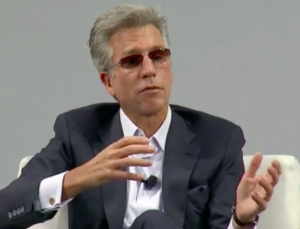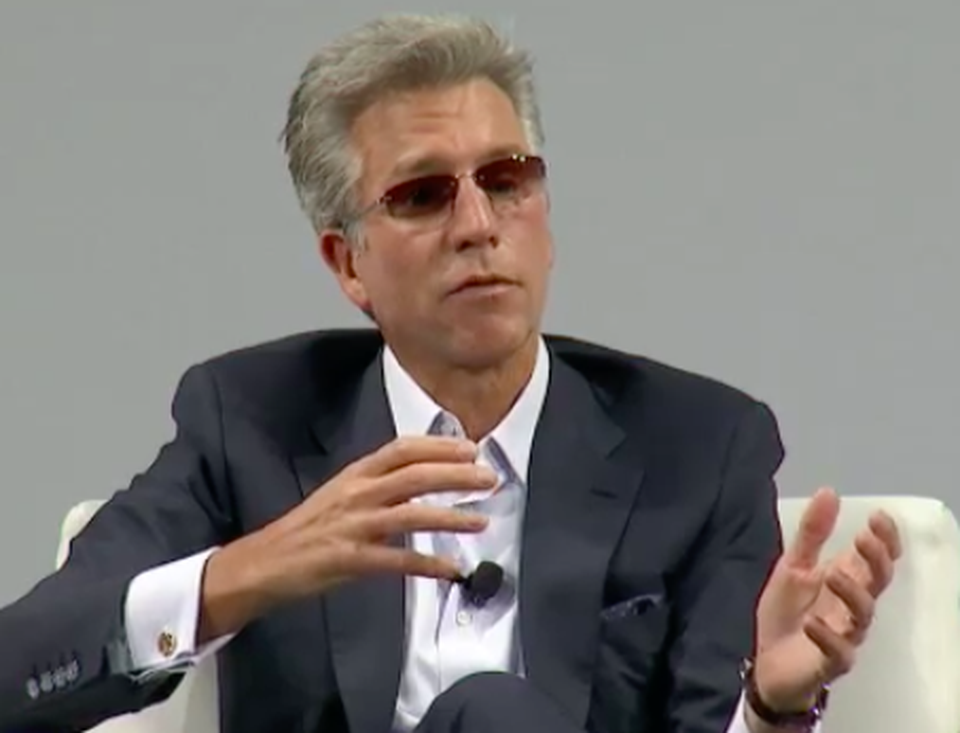
(Note: After an award-winning career in the media business covering the tech industry, Bob Evans was VP of Strategic Communications at SAP in 2011, and Chief Communications Officer at Oracle from 2012 to 2016. He now runs his own firm, Evans Strategic Communications LLC.)
CLOUD WARS –While SAP has made huge strides in the cloud and by many measures is among the top handful of cloud vendors in the world, it was a bit jarring yesterday to see CEO Bill McDermott tell Bloomberg TV that SAP is in fact the #1 cloud company on the planet.
Speaking with host Amanda Lang, McDermott flat-out said, “When you and I were together in 2016, I told you we would be the number one cloud company in the world—and we are the Number One cloud company in the world.”
Here at Cloud Wars, we’ve recognized the excellent progress SAP has made in converting its world-leading enterprise-apps technology and business model from the traditional on-premises approach to the cloud, and for more than a year we’ve placed SAP among the very top cloud providers in the world.
But Microsoft and Amazon have reported cloud revenue that’s about 3 times as large as SAP’s, IBM’s cloud revenue is more than double that of SAP’s, and Salesforce’s is almost twice as large as SAP’s.
So I was intrigued to see just how McDermott would make his case for being king of the cloud—and in his next breath, he cited the huge number of individual corporate users of SAP’s cloud applications, and is apparently using that categorization to make his claim about who’s Number One.
“We now have 150 million users running our technology in the cloud,” said McDermott, without referencing numbers for any of his competitors.
Now, I’m not aware of any legal statute that mandates that cloud supremacy must be based on revenue and not on number of corporate users, so in that sense McDermott and SAP might very well have the right to hold up and waggle their index finger.
However, that volume-of-cloud-users approach would need to be scrutinized a bit more to see how many people around the world use, for example, Microsoft Office 365—I’m not sure it would reach 150 million, but either way it would be a very large number, and Microsoft has lots more users of its other cloud services. After all, LinkedIn has 562 million members/users.
By pegging SAP’s global universe of cloud users at 150 million, McDermott was actually underselling the company’s reach, according to a slide SAP posted as part of its Q2 earnings release.
According to the data about SAP’s various cloud applications contained on that slide, SAP has more than 160 million users of its cloud apps: SuccessFactors, more than 100 million; Concur, 55 million; and CX, 5.6 million.
SAP’s total number of cloud users is likely far above 160 million because that total doesn’t include users of many other SAP cloud services for which numbers were not given: Ariba, Fieldglass, PaaS and more.
And how that total stacks up versus aggregate numbers of cloud users for Microsoft, Amazon, IBM, Salesforce, Oracle and other large-scale cloud vendors is still in question, but we’ll set that question aside until more details can be rounded up.
In the interview, McDermott made a few other compelling points:
- Inside SAP, cloud revenue is indeed #1: “The cloud business model has actually superseded the on-premises business model this year, meaning we’re getting more revenue from the cloud than from a business we built over four decades.”
- On IaaS, collaboration rather than competition: “And over time, it’s very important that we chose a strategy where our reference architecture and our technology also run in the hyperscaler cloud. And we should be where the customer wants us to be—and if that can help them run simple and achieve their goals, then we’re leaning into that change.”
- The primacy of securing customer data: “So we do this in terms of any channel, any device, any human so that for any one of the 7-1/2 billon consumers worldwide, when they do business with SAP or SAP customers, we make sure the customer’s data is the customer’s data, and we make sure the privacy of the individual consumer is fully protected.”
The Cloud Wars are being fought on multiple fronts, and while I largely disagree with McDermott’s anointment of his company as the world’s top cloud vendor, he’s making a legitimate point, and it’s one we’ll be sure to dig into more deeply in a future article or two.
*******************
RECOMMENDED READING FROM CLOUD WARS:
The World’s Top 5 Cloud-Computing Suppliers: #1 Microsoft, #2 Amazon, #3 Salesforce, #4 SAP, #5 IBM
Amazon Versus Oracle: The Battle for Cloud Database Leadership
As Amazon Battles with Retailers, Microsoft Leads Them into the Cloud
Why Microsoft Is #1 in the Cloud: 10 Key Insights
SAP’s Stunning Transformation: Qualtrics Already “Crown Jewel of Company”
Watch Out, Microsoft and Amazon: Google Cloud CEO Thomas Kurian Plans To Be #1
The Coming Hybrid Wave: Where Do Microsoft, IBM and Amazon Stand? (Part 1 of 2)
Oracle, SAP and Workday Driving Red-Hot Cloud ERP Growth Into 2019
*********************
I’ve analyzed and written about the enterprise-tech business for more than 20 years from the media side as an editor-in-chief and chief content officer, and more recently as Chief Communications Officer at Oracle from 2012-2016. I’ve written thousands of articles and columns… MORE
As businesses jump to the cloud to accelerate innovation and engage more intimately with customers, my Cloud Wars series analyze the major cloud vendors from the perspective of business customers.








